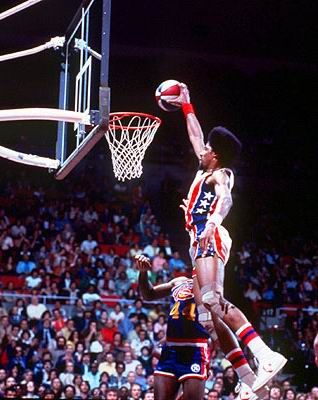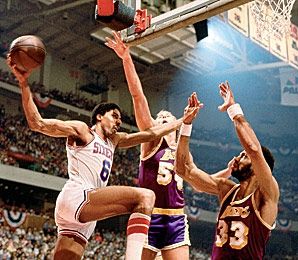'The Doctor' Still Operating on NBA TV
In screening The Doctor, the NBA TV documentary about Julius Erving, it’s fellow basketball Hall of Famer Bill Walton who perhaps sums up the man and the film best.
Walton, who was posterized by several soaring Dr. J dunks during the 1977 Finals, but ultimately won the war between the Philadelphia 76ers and Portland Trail Blazers, said Erving “had the ultimate gift. He made people happy.”

And there's plenty to smile about with the well-worn images of the famous jams and finger rolls during Doc’s NBA career, which on a fourth trip to the championship series finally reached the Promised Land, shepherded by Moses Malone. Much less iconic, but more interesting are the clips in which Erving sported his giant Afro from his ABA heyday, a monster slam from Rucker Park, where Dr. J's legend truly took flight, and his residency at UMass.
There’s also great footage of Erving reminiscing on a walk through his old neighborhood on Long Island and later showing off his now 63-year-old hops.
Several family tragedies are discussed, but the infidelity that yielded former pro tennis player Alexandra Stevenson out of wedlock and a memorabilia sale that claimed his championship rings are not addressed.
And for those too young to remember, the film emphasizes Erving's exalted status in hoops history—as the main reason behind the ABA-NBA merger; how his flair, athleticism and showmanship bridged and presaged today’s modern game; how through his thoughtul, well-spoken eloquence he became a mainstream pitchman for Converse, Coke and Crest at a time when pro baskeball was construed as a Madison Avenue airball; and how many NBA stars viewed the high-flyer in inspirational awe.

Erving – full disclosure here: he is this writer’s all-time favorite athlete – became the face of the NBA before the dawning of the Magic-Bird era and the arrival of His Airness, Michael Jordan, that turned David Stern’s league into a primetime, global entity.
The 90-minute documentary, which premiered on June 10 and continues to air on the league-owned service, is narrated by Chuck D, a graduate of Erving’s alma mater, Roosevelt High School. The rapper reminds that Erving’s era preceded the Internet, camera phones, ubiquitous game coverage and the 24-hour sports cycle. As such, the high-wire act of the world's then-best baller, was not seen nightly. That tale of Erving’s excellence -- his ABA years were played before countless empty seats -- is something that was passed down in many respects by word of mouth.
Consider this another attempt at keeping The Doctor legendary.
Multichannel Newsletter
The smarter way to stay on top of the multichannel video marketplace. Sign up below.
